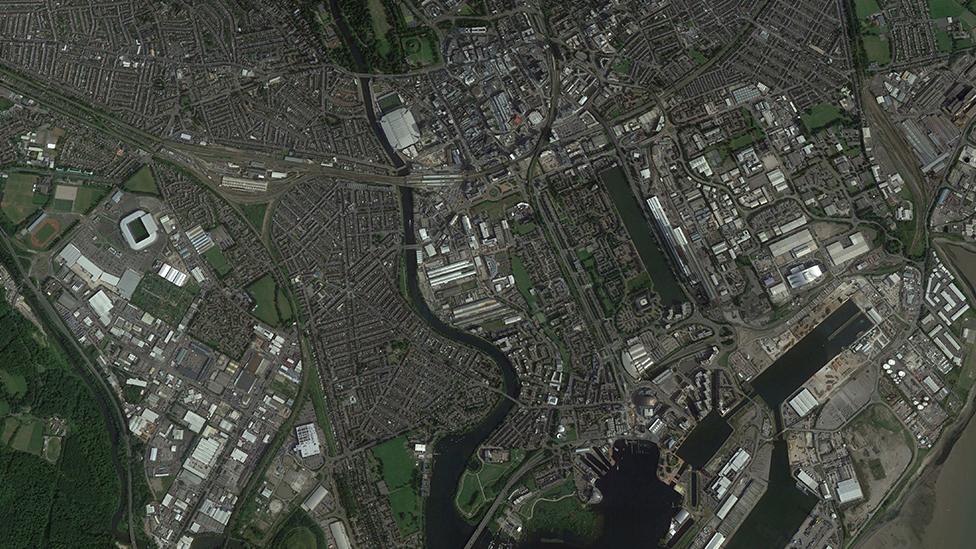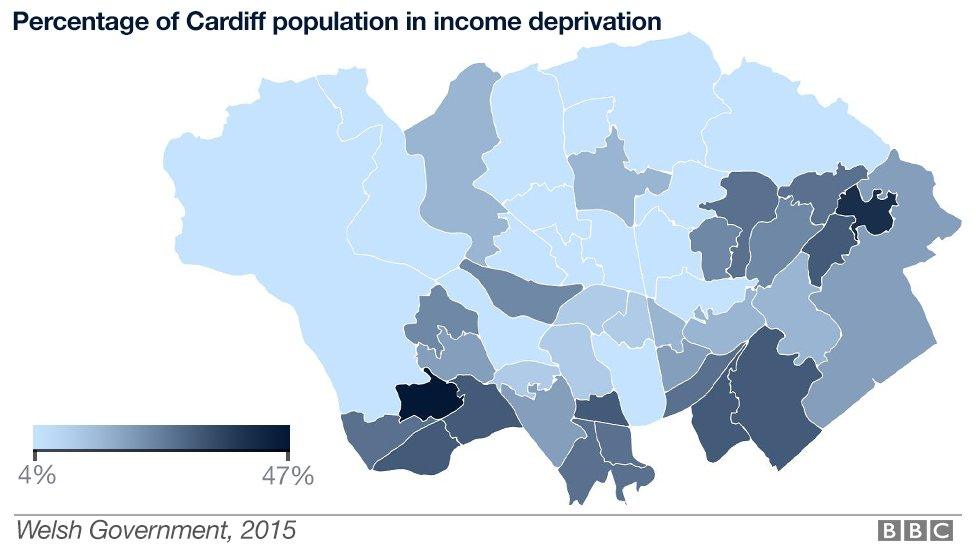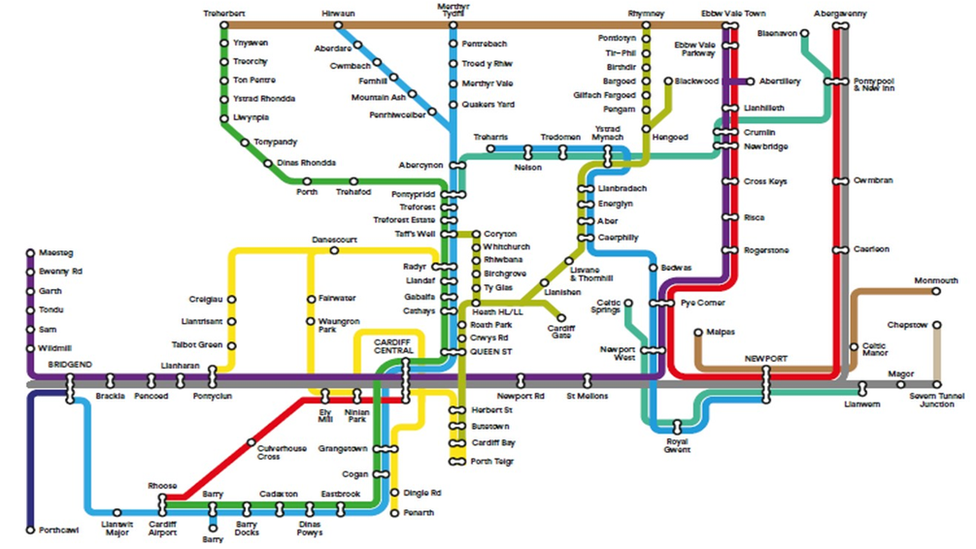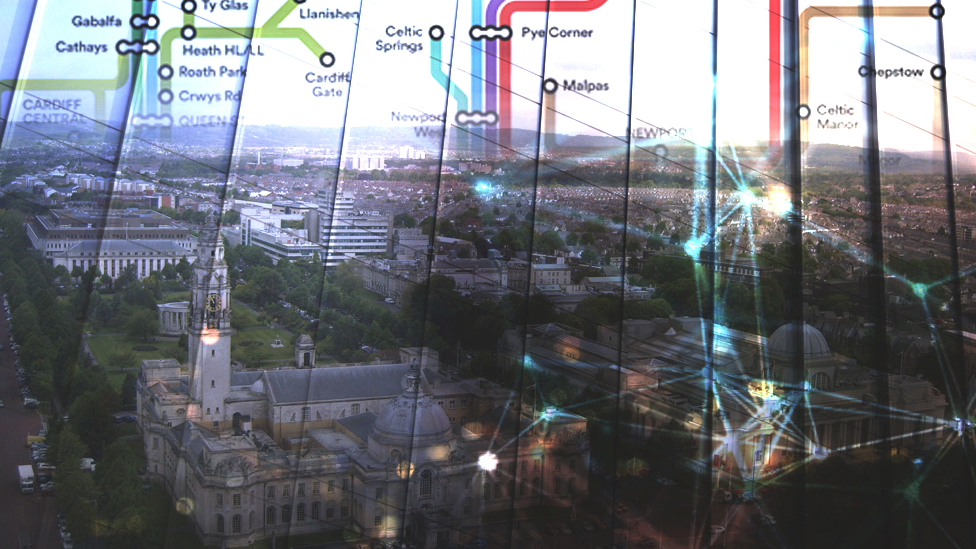Phil Bale: Education key to addressing Cardiff inequalities
- Published

Education is key to addressing "entrenched and growing inequalities" across Cardiff, the city's council leader has said.
Phil Bale was speaking as the Liveable City Report, external was published on Thursday.
The report paints a picture of the city in 2017, setting out its strengths and weaknesses.
It said Cardiff was growing fast and jobs were being created, but highlighted that not everyone was feeling the benefits.
The report, commissioned by Cardiff Public Services Board, looked at a number of aspects of life in the city including the economy, safety, health, environment and education.
It is the task of the board - which includes members of the council, health board, fire service and Natural Resources Wales - to improve these aspects.
Phil Bale: Cardiff Liveable City Report is 'spotlight' on good and bad
Mr Bale, who chairs the board, said inequalities between those living in the north and south of the city were the "most powerful findings" for him.
"All of the evidence shows that if you can get young people from various different backgrounds through school with a good education, that will have long lasting benefits to them and to levels of inequality in society," he told BBC Wales.
"For us, working on our school system, ensuring we have a sufficient number of good paid jobs in the city, are really important challenges for us."
The report was commissioned last year and comes as the council gears up for the local elections on 4 May.
Mr Bale's working majority on the council was cut to three at the end of last year after two fellow Labour councillors quit but he said he had "no need" to resign.


Education
The report showed that while the city's school system is now improving after years of underperformance, too many schools are still underperforming.
The number of pupils achieving at least five A* to C grades at GCSE have increased but the gap in achievement between those who have free school meals and those who do not remains.
Mr Bale said this gap was "one of the key focus points, it is narrowing but still too wide".
Cardiff also has the highest percentage of young people not in education, employment or training of any local authority in Wales.
An Estyn report two years ago said the local authority's education services needed "significant improvement" but in March last year the watchdog said no further intervention was required.
Mr Bale said: "There has been a significant turn-around which is not down to any one individual, it's down to a partnership approach.
"Education has been very clearly a priority of the city council over the last few years.
"But we're not complacent, we know there's more that needs to happen and we're working with schools across the city and with other partners, to ensure that improvement continues."


Social inequality
Residents in deprived areas of the city have lower healthy life expectancy - there is a gap of 22 years for women and 24 years for men between the least and most deprived areas.
They are also less likely to have a job - unemployment rates in Ely are nearly 10 times higher than those in Creigiau.
There are marked differences in prosperity between the north and south of the city and the report said addressing these inequalities was "fundamental" to the city's future.
For example, 41,000 homes in Cardiff - more than a quarter - are already deemed to be living in poverty.


The report highlighted how a Cardiff Metro could boost economic growth in the city
Infrastructure
The city is projected to grow faster than all major British cities, apart from London, over the next 20 years - an additional 72,000 people between 2015 and 2035.
The report said this would bring challenges as well as opportunities, putting pressure on both the infrastructure and public services.
The Cardiff Capital Region City Deal, Cardiff Metro and effective city-regional governance will be fundamentally important in delivering sustainable, inclusive economic growth, the report added.
Mr Bale said: "We recognise that initiatives like the city deal where a number of councils and other partners come together can have transformational benefits.
"We have historically worked not very well together as a region and that has to change because cities and city regions across the world are increasingly working as one.
"They recognise that if they want to attract investment, if they want to develop more jobs for people across the region, they have to work together with stresses and strains on budgets and resources."

However, his comments have drawn criticism from other parties on the city council.
Conservative councillor Jayne Cowan said: "If Phil Bale thinks education is critical to stop inequality, I'd like to ask him what he's done since his group have been in power since 2012?
"We are seeing many young people being failed by this council and it's essential that we get a grip on this in order to give every child the same opportunity to excel in education, sport and extra curricular activities."
'Desperate need'
Neil McEvoy, leader of Cardiff's Plaid Cymru group, added: "Labour's legacy is one of division and inequality, with staggering attacks on services and the environment with its local destruction plan.
"Cardiff Plaid, in just 14 weeks time, will have the opportunity to throw out the LDP.
"Schools in desperate need like Cantonian will finally get the investment they need. We'll put pride back in our capital city."
There will be a six-week consultation on the report with the public and other agencies, before it goes back to the Public Services Board in March for approval.
The board will then create a draft plan with a view to it being published in spring 2018.
- Published8 January 2017

- Published13 October 2016
